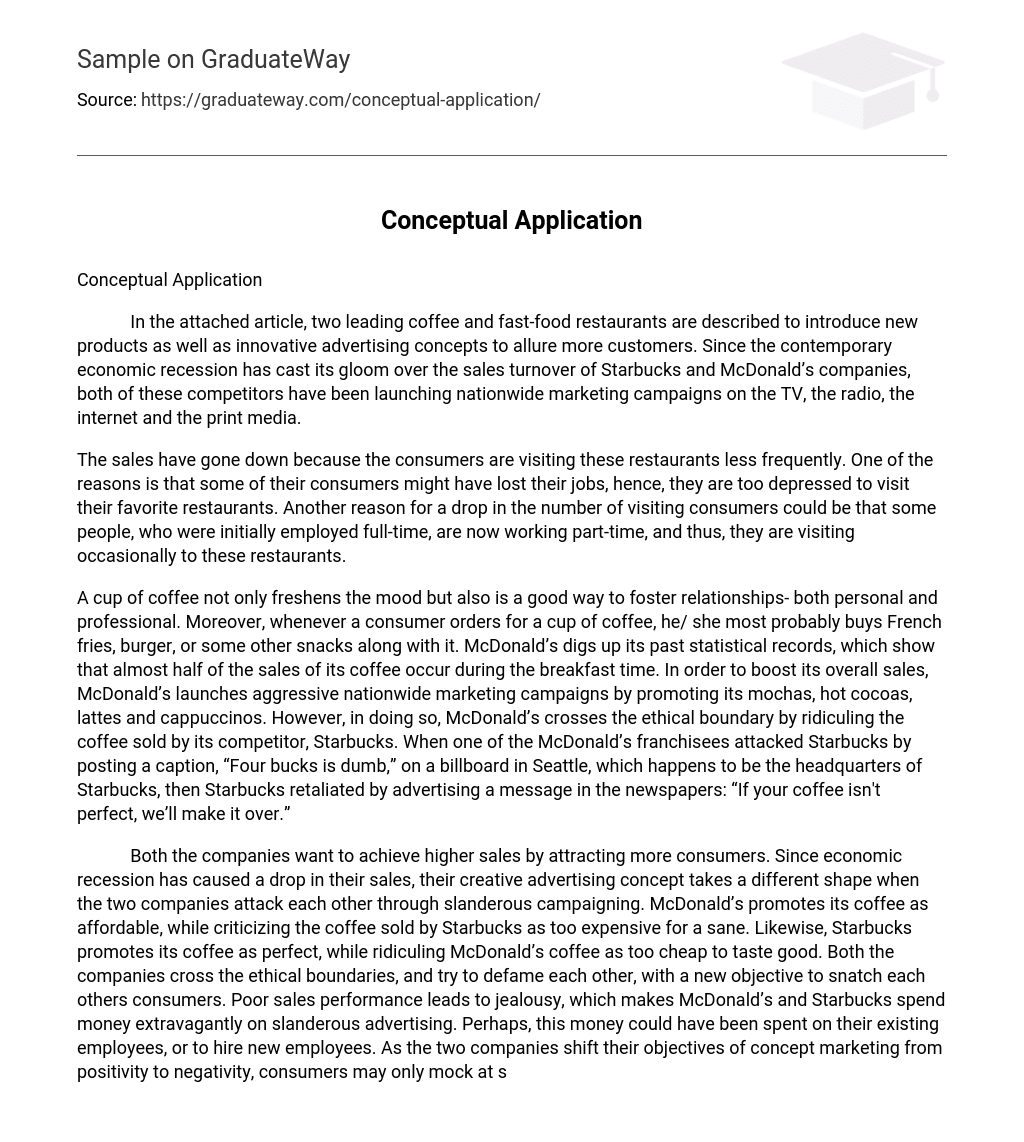In the attached article, two leading coffee and fast-food restaurants are described to introduce new products as well as innovative advertising concepts to allure more customers. Since the contemporary economic recession has cast its gloom over the sales turnover of Starbucks and McDonald’s companies, both of these competitors have been launching nationwide marketing campaigns on the TV, the radio, the internet and the print media.
The sales have gone down because the consumers are visiting these restaurants less frequently. One of the reasons is that some of their consumers might have lost their jobs, hence, they are too depressed to visit their favorite restaurants. Another reason for a drop in the number of visiting consumers could be that some people, who were initially employed full-time, are now working part-time, and thus, they are visiting occasionally to these restaurants.
A cup of coffee not only freshens the mood but also is a good way to foster relationships- both personal and professional. Moreover, whenever a consumer orders for a cup of coffee, he/ she most probably buys French fries, burger, or some other snacks along with it. McDonald’s digs up its past statistical records, which show that almost half of the sales of its coffee occur during the breakfast time. In order to boost its overall sales, McDonald’s launches aggressive nationwide marketing campaigns by promoting its mochas, hot cocoas, lattes and cappuccinos. However, in doing so, McDonald’s crosses the ethical boundary by ridiculing the coffee sold by its competitor, Starbucks. When one of the McDonald’s franchisees attacked Starbucks by posting a caption, “Four bucks is dumb,” on a billboard in Seattle, which happens to be the headquarters of Starbucks, then Starbucks retaliated by advertising a message in the newspapers: “If your coffee isn’t perfect, we’ll make it over.”
Both the companies want to achieve higher sales by attracting more consumers. Since economic recession has caused a drop in their sales, their creative advertising concept takes a different shape when the two companies attack each other through slanderous campaigning. McDonald’s promotes its coffee as affordable, while criticizing the coffee sold by Starbucks as too expensive for a sane. Likewise, Starbucks promotes its coffee as perfect, while ridiculing McDonald’s coffee as too cheap to taste good. Both the companies cross the ethical boundaries, and try to defame each other, with a new objective to snatch each others consumers. Poor sales performance leads to jealousy, which makes McDonald’s and Starbucks spend money extravagantly on slanderous advertising. Perhaps, this money could have been spent on their existing employees, or to hire new employees. As the two companies shift their objectives of concept marketing from positivity to negativity, consumers may only mock at such strategies. Most of the consumers want to enjoy a cup of coffee in a relaxed environment. Hence, they would like to try new types of coffee and brands without worrying too much for costs that may be only a few cents different. Once they relish the taste of a particular type of coffee and brand, the consumers develop kinship and brand fidelity.
The economic recession has caused a drop in sales of Burger King as well, but it has not been involved in rival marketing strategies. With the objective of effectively marketing their coffee, and to gradually develop brand fidelity, it is apparent that Starbucks and McDonald’s, eventually, vie for gaining the number one spot image through introduction of new coffee brands, price structure, and marketing strategies. It is up to the consumers to decide whose coffee is tastier, more rejuvenating and more enjoyable for the time and money spent inside the restaurant. It is the consumer who decides the success of concept marketing, either by accepting it, or discarding it.





